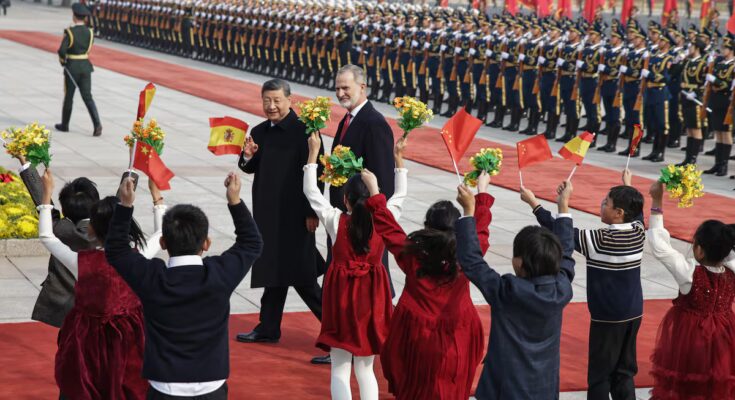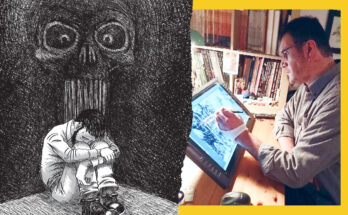China and Spain reaffirm their ties. King Philip VI and Chinese President Xi Jinping had a bilateral meeting this Wednesday in which they underlined the harmony between the two countries. The Chinese leader cited the history of diplomatic relations as “an example of friendly coexistence between countries with different histories, cultures and social systems.” The King then recalled how, since the Crown’s first visit to China in 1978, “solid relationships” and “mutual trust” had been established.
“We believe that the friendship between Spain and China is undoubtedly beneficial for both peoples and is consistent with two countries with a long history and a global vocation,” said the monarch in the introductory words of the face-to-face meeting, the most politically important event of the Kings’ visit to the People’s Republic.
The interview took place in the Great Hall of the People, the enormous building reserved for high-level meetings, located on one side of Tiananmen Square, during the second day of the Kings’ official visit to China. Beijing, the Chinese capital, is the second and final stop on the trip, after passing through Chengdu, in the south-west of the country, on Tuesday. Later in the day, the Kings will attend a gala dinner hosted by their hosts and a concert by the Royal Spanish Theater Orchestra at the National Center for the Performing Arts in Beijing.
After about an hour and a half, the meeting ended with the signing of 10 agreements and conventions, including a memorandum of understanding to create a joint economic cooperation commission, a sort of “single window” to urgently resolve the access problems of Spanish companies to the Chinese market and vice versa, according to a source in the Spanish delegation.
Philip VI underlined that this state visit, the first of the Kings of Spain in 18 years, “has a very important component in terms of business, of economy”, and offered the opportunity to “also highlight collaborations in the highest technologies”. And he recalled his first trip to China, as a prince, in 2000: “Without a doubt, the advancement and progress (of the country) since that year are very remarkable,” he acknowledged.
Xi, who called him “a good friend of the Chinese people”, recalled the first visit of Juan Carlos I in 1978, when the country began its policy of reform and opening, and recognized the contribution of both “to global cooperation for open development and the defense of international equity and justice”.
Faced with a “complex and changing” international landscape, the world needs “more constructive forces committed to peace and development”, added the communist leader. “China is willing to work together with Spain to build a comprehensive strategic partnership that is more firm in its orientation, more dynamic in its development and with greater international influence, in order to contribute even more significantly to the prosperity, peace and development of the world,” he noted.
The visit of the Kings is part of a path of growing harmony between Beijing and Madrid, and adds to the three trips that the president of the government, Pedro Sánchez, has made to China since 2023, and to the investment boom of the Asian giant’s companies in recent years, which have earned Spain the disapproval of some European capitals in diplomatic circles.
The Spanish flags flying in Tiananmen this Wednesday are a sign of the agreement between the two countries. The Kings arrived at the Eastern Gate aboard a Chinese car, Hongqi (Red Flag) make, on one of those foggy, pale days of pollution that sometimes continue to envelop Beijing. After the salute at the foot of the steps of the city’s Great Hall, a military band played the anthems of the two countries while eight cannons fired salvos into the air.
The two heads of state reviewed the Chinese troops, and marched together with nearly a hundred children who exclaimed “Huānyíng, huānyíng, rèliè, huānyíng!” (Welcome, welcome, warm welcome!) and waved bouquets and flags of both countries. The military band, among the Chinese marches, performed the work in an instant with a pasodoble air. Seville, by the Spanish composer Isaac Albéniz.
The 10 documents signed by both sides touch on very different legs; from linguistic cooperation to deepen the teaching of Spanish in China to the collaboration between the Institute of Astrophysics of the Canary Islands and the Institute of Optics and Astronomical Technology of Nanjing, through a film and audiovisual co-production agreement. Protocols on aquaculture products were also signed; of oil and fishmeal for animal feed and food safety.
The temporary tariffs on European pork that Beijing imposed in September in retaliation for EU tariffs on electric cars have not been addressed, at least publicly. Pork is a major Spanish export item to China and the official visit was seen by the industry as an opportunity to put pressure on the Chinese government to reconsider the taxes, before making a final decision in December.
The question of access to the very complicated Chinese market is one of the most insistent requests from Spain and the EU. The joint economic cooperation commission announced and whose creation was signed by the Spanish Minister of Economy, Carlos Body, and the Chinese Minister of Commerce, Wang Wentao, seems to go in this direction, even if no details were provided.
After the signatures, the Kings offered a floral offering in front of the monument to the People’s Heroes, the 38 meter high obelisk erected in the center of Tiananmen, dedicated to the martyrs of the revolutionary struggle of the 19th and 20th centuries. To the north was the Gate of Heavenly Peace (Tiannamen), giving access to the Forbidden City, with the portrait of Mao Zedong attached to its reddish walls; To the south, the mausoleum where the founder of the People’s Republic is preserved embalmed.
During the signing of the agreements, Queen Letizia went together with the first lady, Peng Liyuan, to the Huiai center for people with disabilities, the most advanced at a provincial level in all of China. The complex combines cutting-edge assistive technologies with rehabilitation, education and social integration programs. The activity included a guided tour of part of the facilities and short meetings with children, adolescents and adults of the centre.
Xixi is the founder of the association Beginning of the novelcreated in 2014 and dedicated to the training and empowerment of people with physical disabilities. They offer artisan workshops that allow them to create and sell their own works, mainly small crochet objects made with ecological materials. Xixi explained to Letizia Ortiz that her organization has helped more than 4,000 people and gave her a crocheted bouquet of flowers. Xixi – whose English name is Sissi, “like the empress” – shared her personal story with the Queen: she learned English in Germany, where she lived for a few years. One day, before returning to China, she suffered an accident that left her in a wheelchair. From that trauma, he says, the vocation to help others in his condition was born.
Restrictions imposed by Chinese security authorities made it difficult for news coverage of the entire event to develop normally. In particular, they prevented the three accredited Spanish media – including this newspaper – from accessing the room where the robotic advances are displayed while the Queen and first lady were visiting, despite having been able to visit it previously.
A group of blind children performed song and smile to greet Queen Letizia, a happy and well-known topic that is taught in schools throughout the country. The lyrics speak of hope, friendship and the joy of sharing, a symbol of optimism for several generations. After the Spanish delegation left, Peng spent a couple more minutes exchanging words with the children. “This doesn’t interest you,” the Chinese protocol officers underlined, inviting journalists to leave the post.



